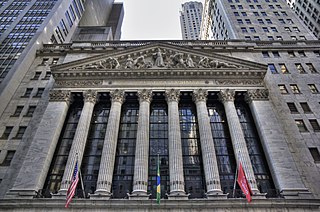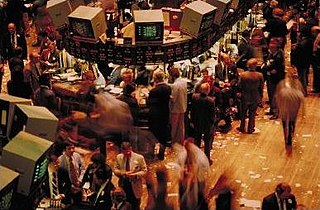The exchange-traded funds available on exchanges vary from country to country. Many of the ETFs listed below are available exclusively on that nation's primary stock exchange and cannot be purchased on a foreign stock exchange.

A stock exchange, securities exchange, or bourse is an exchange where stockbrokers and traders can buy and sell securities, such as shares of stock, bonds and other financial instruments. Stock exchanges may also provide facilities for the issue and redemption of such securities and instruments and capital events including the payment of income and dividends. Securities traded on a stock exchange include stock issued by listed companies, unit trusts, derivatives, pooled investment products and bonds. Stock exchanges often function as "continuous auction" markets with buyers and sellers consummating transactions via open outcry at a central location such as the floor of the exchange or by using an electronic trading platform.

A capital market is a financial market in which long-term debt or equity-backed securities are bought and sold, in contrast to a money market where short-term debt is bought and sold. Capital markets channel the wealth of savers to those who can put it to long-term productive use, such as companies or governments making long-term investments. Financial regulators like Securities and Exchange Board of India (SEBI), Bank of England (BoE) and the U.S. Securities and Exchange Commission (SEC) oversee capital markets to protect investors against fraud, among other duties.

A stock market, equity market, or share market is the aggregation of buyers and sellers of stocks, which represent ownership claims on businesses; these may include securities listed on a public stock exchange, as well as stock that is only traded privately, such as shares of private companies which are sold to investors through equity crowdfunding platforms. Investment is usually made with an investment strategy in mind.
Open-end fund is a collective investment scheme that can issue and redeem shares at any time. An investor will generally purchase shares in the fund directly from the fund itself, rather than from the existing shareholders. The term contrasts with a closed-end fund, which typically issues at the outset all the shares that it will issue, with such shares usually thereafter being tradable among investors.
A closed-end fund (CEF) is a fund that raises capital by issuing a fixed number of shares which are not redeemable, and then invest that capital in financial assets such as stocks and bonds. Unlike open-end funds, new shares in a closed-end fund are not created by managers to meet demand from investors. Instead, the shares can be purchased and sold only in the market, which is the original design of the mutual fund, which predates open-end mutual funds but offers the same actively-managed pooled investments.
Investment banking pertains to certain activities of a financial services company or a corporate division that consist in advisory-based financial transactions on behalf of individuals, corporations, and governments. Traditionally associated with corporate finance, such a bank might assist in raising financial capital by underwriting or acting as the client's agent in the issuance of debt or equity securities. An investment bank may also assist companies involved in mergers and acquisitions (M&A) and provide ancillary services such as market making, trading of derivatives and equity securities, FICC services or research. Most investment banks maintain prime brokerage and asset management departments in conjunction with their investment research businesses. As an industry, it is broken up into the Bulge Bracket, Middle Market, and boutique market.
A mutual fund is an investment fund that pools money from many investors to purchase securities. The term is typically used in the United States, Canada, and India, while similar structures across the globe include the SICAV in Europe and open-ended investment company (OEIC) in the UK.

Financial services are the economic services provided by the finance industry, which encompasses a broad range of businesses that manage money, including credit unions, banks, credit-card companies, insurance companies, accountancy companies, consumer-finance companies, stock brokerages, investment funds, individual asset managers, and some government-sponsored enterprises.
An exchange-traded fund (ETF) is a type of investment fund and exchange-traded product, i.e. they are traded on stock exchanges. ETFs are similar in many ways to mutual funds, except that ETFs are bought and sold from other owners throughout the day on stock exchanges whereas mutual funds are bought and sold from the issuer based on their price at day's end. An ETF holds assets such as stocks, bonds, currencies, futures contracts, and/or commodities such as gold bars, and generally operates with an arbitrage mechanism designed to keep it trading close to its net asset value, although deviations can occasionally occur. Most ETFs are index funds: that is, they hold the same securities in the same proportions as a certain stock market index or bond market index. The most popular ETFs in the U.S. replicate the S&P 500, the total market index, the NASDAQ-100 index, the price of gold, the "growth" stocks in the Russell 1000 Index, or the index of the largest technology companies. With the exception of non-transparent actively managed ETFs, in most cases, the list of stocks that each ETF owns, as well as their weightings, is posted daily on the website of the issuer. The largest ETFs have annual fees of 0.03% of the amount invested, or even lower, although specialty ETFs can have annual fees well in excess of 1% of the amount invested. These fees are paid to the ETF issuer out of dividends received from the underlying holdings or from selling assets.

Euronext Dublin is Ireland's main stock exchange, and has been in existence since 1793.
A "fund of funds" (FOF) is an investment strategy of holding a portfolio of other investment funds rather than investing directly in stocks, bonds or other securities. This type of investing is often referred to as multi-manager investment. A fund of funds may be "fettered", meaning that it invests only in funds managed by the same investment company, or "unfettered", meaning that it can invest in external funds run by other managers.

The Casablanca Stock Exchange is a stock exchange in Casablanca, Morocco. The Casablanca Stock Exchange (CSE), which achieves one of the best performances in the region of the Middle East and North Africa (MENA), is Africa's third largest stock market after Johannesburg Stock Exchange and Nigerian Stock Exchange in Lagos. It was established in 1929 and currently has 19 members and 81 listed securities with a total market capitalisation of $71.1 billion in 2018.

ETF Securities is an asset management firm that issues exchange-traded funds (ETFs) primarily in Australia.

A sovereign wealth fund (SWF), sovereign investment fund, or social wealth fund is a state-owned investment fund that invests in real and financial assets such as stocks, bonds, real estate, precious metals, or in alternative investments such as private equity fund or hedge funds. Sovereign wealth funds invest globally. Most SWFs are funded by revenues from commodity exports or from foreign-exchange reserves held by the central bank.
Virtus Investment Partners, Inc. operates a multi-manager asset management business, comprising a number of individual affiliated managers, each having its own investment process and brand, and the services of unaffiliated subadvisers.

Bips Investment Managers is the exchange-traded fund division of Rand Merchant Bank (RMB) a division of FirstRand Bank Limited, one of South Africa’s largest JSE-listed financial services groups.
An exchange-traded product (ETP) is a regularly priced security which trades during the day on a national stock exchange. ETPs may embed derivatives but it is not a requirement that they do so – and the investment memorandum should be read with care to ensure that the pricing methodology and use of derivatives is explicitly stated. Typically, individual underlying securities, such as stocks and bonds, are not considered ETPs.

An investment fund is a way of investing money alongside other investors in order to benefit from the inherent advantages of working as part of a group such as reducing the risks of the investment by a significant percentage. These advantages include an ability to:

Asia Frontier Capital Ltd. is an investment company created by a management buyout of Leopard Capital by the former CFO and COO, Thomas Hugger, at the end of May 2013. Leopard Capital Management Ltd. was subsequently renamed Asia Frontier Capital Ltd. The group manages the AFC Asia Frontier Fund, AFC Iraq Fund, AFC Uzbekistan Fund, and AFC Vietnam Fund. All funds are open-end funds under the AFC Umbrella fund for US investors or AFC Umbrella fund (non-US) for investors outside from the US. Investors can subscribe or redeem the funds monthly at net asset value.